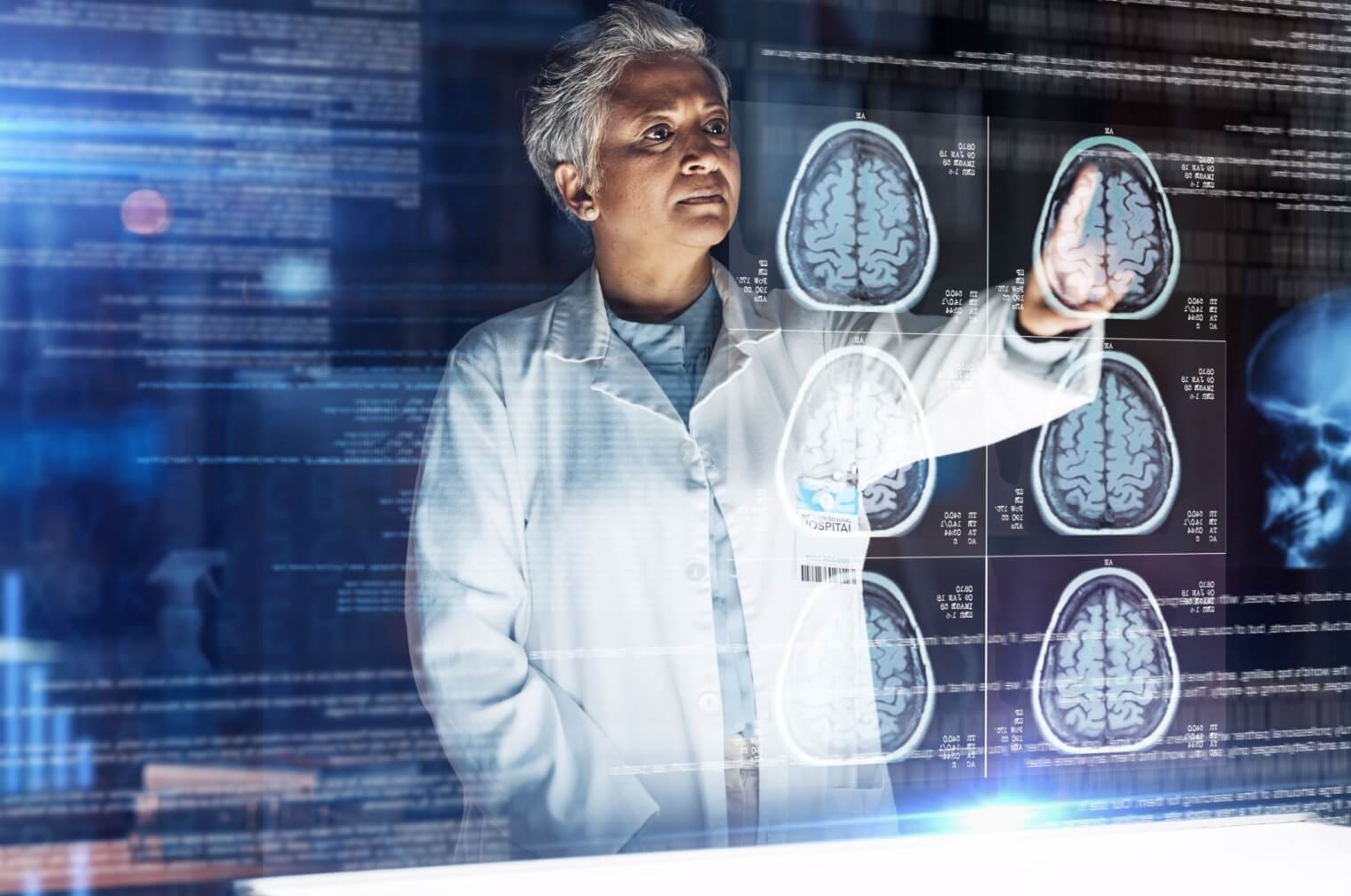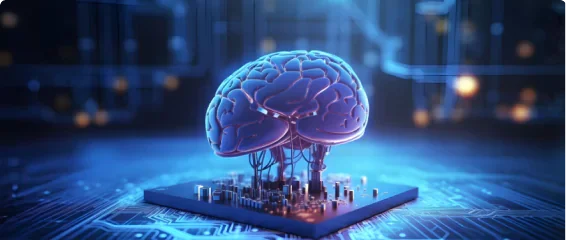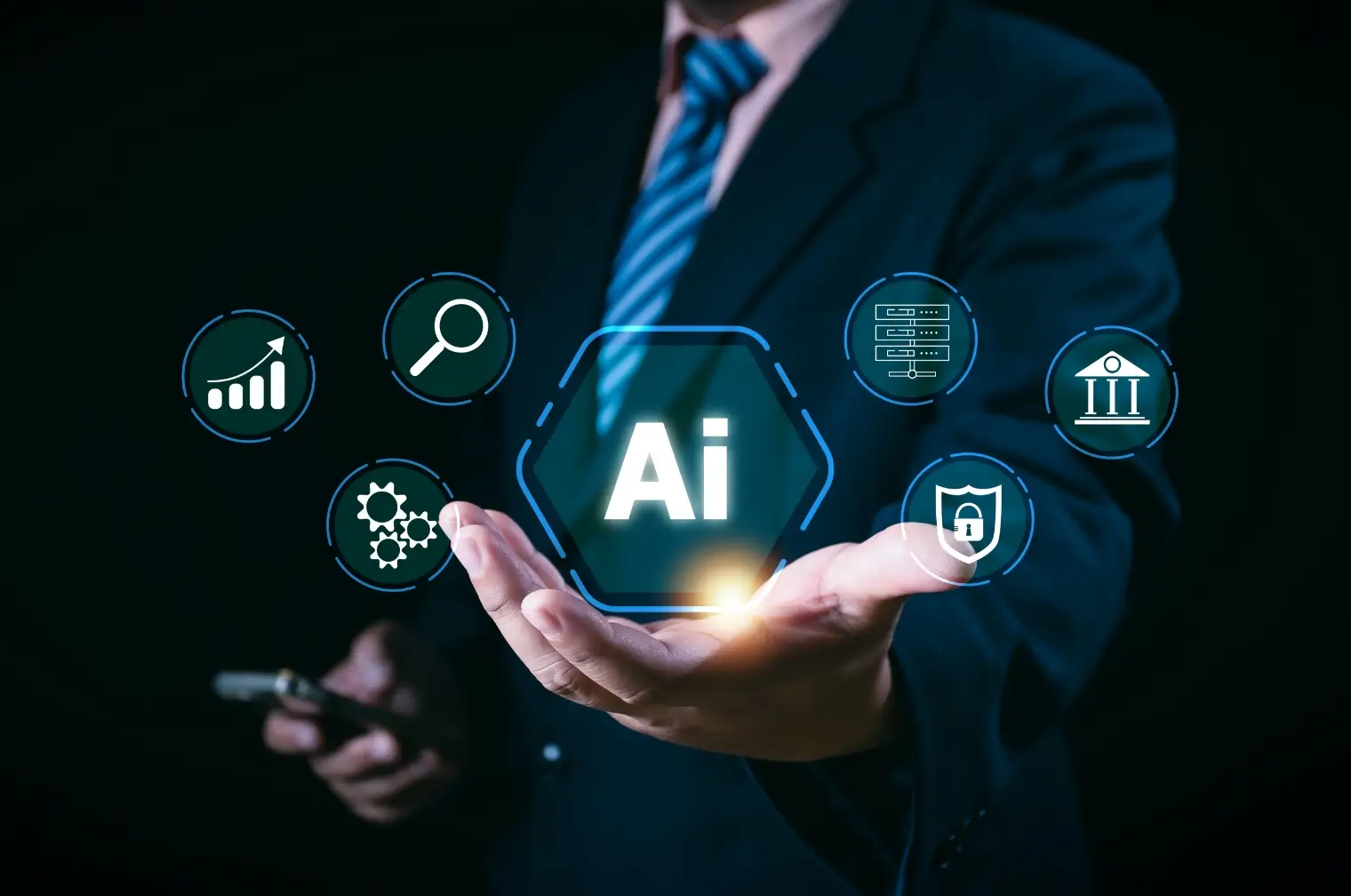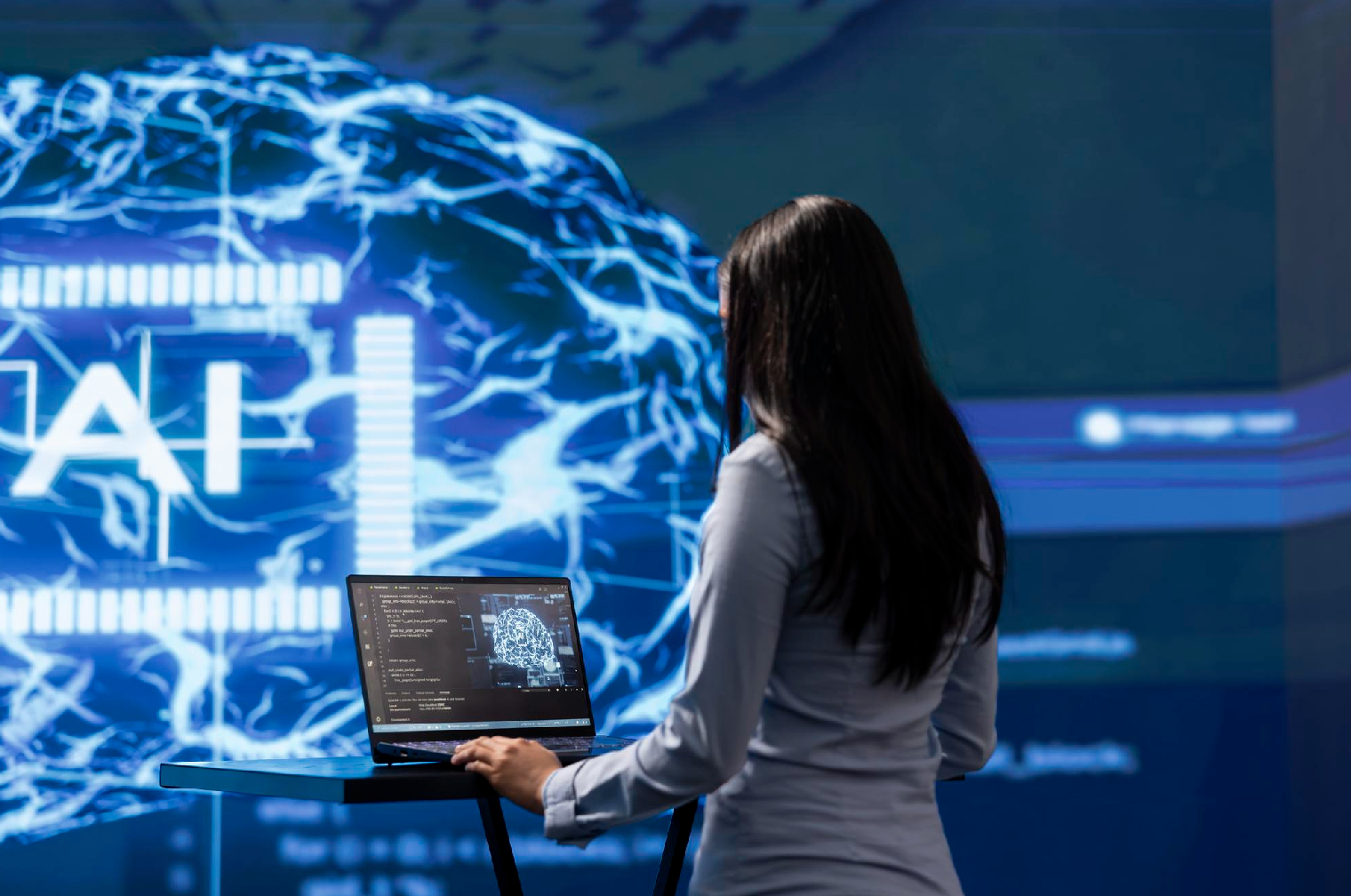Machine Learning and AI for revolution of Tech Companies are changing and streamlining businesses.
The integration of Artificial Intelligence (AI) in the healthcare sector represents not only a casual development but rather a transformative force with the potential to profoundly reshape medical methodologies and enhance patient experiences. The increasing complexities of diseases and the rapid growth of data have made AI development in healthcare indispensable to cater to the demand for precision, improved effectiveness, and personalized attention to health matters.
As we stand at the threshold of this medical evolution, it’s easy to see why AI in healthcare has become so crucial. Medical data has exploded like a supernova, completely inundating human analytical capacity and insight. These AI healthcare use case solutions can detect complex patterns, predict diseases before they strike, and uncover treatment pathways once lost within massive amounts of medical data.
AI takes advantage of extensive data from different sources, such as medical records, images, tests, and sensors, making it more effective and precise in medical interventions. ViitorCloud explores 11 innovative AI use cases in the healthcare industry.
Why is the Healthcare Sector Turning into AI?
The healthcare sector is turning increasingly towards AI for various compelling reasons.
According to Precedence Research (2021), the worldwide artificial intelligence market size for healthcare was valued at USD 15.1 billion in 2022, with a projection beyond USD 187.95 billion by 2030, representing an outstanding CAGR (Compound Annual Growth Rate) of 37%. North America alone demonstrated significant prominence, with a market value of USD 6.8 billion in 2022.
An overwhelming amount of medical information is being produced today, including electronic health records, imaging studies, genetic profiles, and patient-generated data. The list continues ad infinitum (and beyond). The efficient analysis would take humans longer than forever since too much information is generated daily.
Big datasets can be quickly processed and analyzed by algorithms developed for artificial intelligence, revealing hidden patterns or insights that some might miss if left to human analysts.
AI technology stands out as one potential game-changer across multiple aspects of health care:
- Diagnostic accuracy intensification
- Individualized treatment
- Efficiency improvement
- Prediction and prevention of diseases
- Promotion of research, patient involvement in care, dealing with staff deficiency
- Cost reduction as well as remote delivery
With the ongoing advancements in AI technology, its integration into healthcare will transform how medical care is delivered and received resulting in improved patient outcomes and more efficient health systems.
READ: How AI Is Transforming Healthcare Startups: Key Benefits and Insights
Upgrade Healthcare with Artificial Intelligence. Capitalize on the potential of AI within your healthcare solutions. Collaborate with our team to integrate advanced AI technologies into your organization.
AI in Healthcare: Top 11 Use Cases
AI is transforming healthcare delivery by improving diagnostic accuracy, which leads to enhanced patient care. Below are 11 pioneering use cases where AI has greatly affected healthcare.
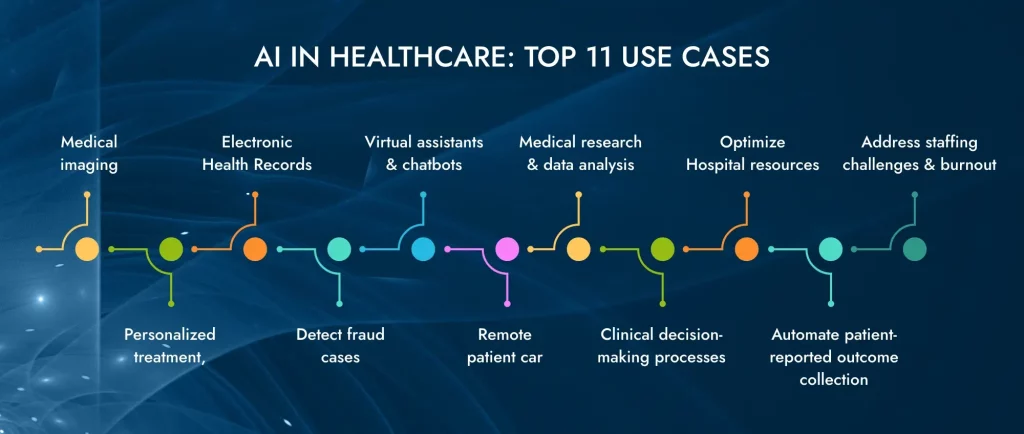
1. Medical Imaging
Medical imaging is a major application area for artificial intelligence (AI) in health care. AI can precisely analyze medical images, including computed tomography (CT) scans, magnetic resonance imaging (MRI), and X-rays, providing physicians with crucial insights about patients’ conditions. This technology significantly enhances the accuracy and speed of diagnoses, ultimately improving patient outcomes.
A recent survey by European Radiology Experimental indicates that more than half of global healthcare leaders anticipate significant growth in AI’s role in monitoring and diagnosis. AI algorithms excel in analyzing radiology images, such as X-rays and CT scans, to assist in diagnosing diseases like pneumonia and tuberculosis. These AI tools improve diagnostic efficiency and patient outcomes by providing faster and more accurate interpretations.
AI in medical imaging is transforming healthcare by enhancing diagnostic accuracy and speed. From identifying lung nodules and osteoporosis to detecting brain tumors, Alzheimer’s, and diabetic retinopathy, AI’s capabilities are vast and impactful.
2. Personalized Treatment
The healthcare revolution underwent a paradigm shift with personalized treatment. With the help of AI algorithms that analyze the medical history of patients in addition to their genetics and even habits like diet and exercise regimen for disease risk prediction and guidance on individualized treatment strategies, this technology provides personalized care, which increases patient outcomes and overall health as well. The following are some specific examples of AI applications in healthcare.
The other way AI can be used within this field is by remotely monitoring patients’ condition changes. As an illustration, heart rate and blood pressure data could be analyzed by AI algorithms to identify possible pre-symptoms of heart diseases. This is useful in managing chronic conditions like diabetes.
Furthermore, wearable devices powered by AI can monitor vital signs continuously and detect significant changes that require immediate intervention by doctors to prevent complications. Artificial intelligence (AI) integration in healthcare has transformed personalized treatment delivery systems, thus making them more precise, effective, and customized per patient needs.
3. Electronic Health Records (EHRs)
Modern healthcare delivery depends heavily on electronic health records (EHRs) which are increasingly being managed through AI technologies. Medical professionals can use artificial intelligence to analyze large amounts of medical data for patterns and trends that help with the prevention and treatment of diseases.
For instance, AI can screen EHR data to identify patients at high risk of developing certain diseases – thereby enabling the formulation of targeted prevention strategies.
4. Detect Fraud Cases
AI plays a key role in identifying healthcare fraud by analyzing large volumes of medical and billing information for irregularities or inconsistencies. It establishes baseline behaviors and flags deviations such as overcharging or unnecessary procedures. Machine learning algorithms improve over time, enhancing the accuracy of identifying fraudulent claims.
Besides, AI may also use different sources to discover relationships that would have otherwise been overlooked saving many resources for health systems (so they do not lose money), stopping losses from misappropriation cases thus emphasizing real patient care. For example, AI can detect billing patterns indicative of fraud, such as duplicate billing or charges for services not rendered, helping to prevent healthcare fraud and ensuring appropriate patient care.
5. Virtual Assistants & Chatbots
AI-powered virtual assistants as well as chatbots are crucial components in remote patient care provision since they assist individuals during diagnoses while freeing up physicians’ time for complex problem-solving activities like diagnosis.
Such smart tools provide personal advice concerning health matters and various forms of aid whenever required by patients themselves. Some hours are taken up within your day before you get your feedback regarding the prescription you want on either side effects or interaction with other types of medications. Also, virtual caregivers can give information about the disease symptoms and home remedies or mention when medical help is required.
Additionally, AI-driven personal assistants and chatbots take care of appointment scheduling and other administrative duties, thus reducing the burden on healthcare workers and enhancing patient satisfaction. They enable patients to request appointments or seek information about scheduled ones through chatbots.
ALSO READ: How AI Is Redefining Healthcare: 11 Transformative Applications
6. Remote Patient Care
Remote patient care employs AI-fueled technology to deliver healthcare services and also monitor patients irrespective of their location. This priority is focused on convenience, accessibility, and prompt interventions with improved patient outcomes while lowering the costs of healthcare. Patients receive live medical attention, share health data, and be guided in remote treatments.
Healthcare providers use AI to interpret this information and look for any early signs of potential problems. Such a complete but distant approach promotes proactive care, reduces hospital stays, and enhances health effectiveness. For example, using an AI algorithm a diabetic can manage his/her glucose level continuously via a wearable device.
7. Medical Research & Data Analysis
Medical research requires extensive analysis of data to unearth disease insights regarding treatment options as well as patient outcomes. Scientists leverage statistics plus AI algorithms when amassing and interpreting big datasets thereby revealing patterns, correlations, or possible breakthroughs.
This data-driven method expedites discoveries, helps drug development, and improves clinical practice. For instance, investigators may obtain patient records together with clinical trial results among other genetic data concerning the new cancer remedy’s efficacy).
The researchers will then identify whether certain genetic markers suggest which patients might respond positively to the treatment using statistical methods along with artificial intelligence algorithms. This ensures targeted personalized therapies that would improve outcomes for patients who are less likely to benefit from unnecessary treatments. By analyzing data, medics arrive at a result where medical intervention becomes much more precise than before in terms of both its quality as well as its effectiveness.
8. Clinical Decision-Making Processes
AI in healthcare is a great promise for clinical decision-making and helps healthcare professionals to make accurate diagnoses. AI use cases in healthcare analyses comprehensive patients’ data including medical records, lab results, past treatments, and medical images such as MRIs and X-rays. Doctors combine their knowledge with AI tools that process vast amounts of data, which help identify models or possible treatment outcomes.
9. Optimize Hospital Resources
Hospital resource optimization involves predictive analytics in determining the most effective use of resources within a healthcare institution especially focusing on bed management and staffing. The AI use cases in healthcare systems employ sophisticated algorithms that consider historical data, current patient loads, and other variables to predict hospital resource requirements in the future.
A predictive analytics model for bed management helps forecast patient admissions, discharges, and transfers ensuring there are adequate beds available whenever needed. Equally, when it comes to AI healthcare solutions to staff the system foresees patient inflows assigning them corresponding personnel to avoid cases of understaffing or overstaffing.
10. Automate Patient-Reported Outcome Collection
The automation of the collection of Patient-Reported Outcomes (PROs) through AI chatbots is transforming healthcare data gathering across various settings. The intelligent chatbot approach allows direct communication between these machines and patients who talk about their well-being, side effects from the treatments they undergo, and life quality generally speaking.
AI use cases in healthcare software can engage patients in a natural conversation style hence collecting essential health information without necessarily having healthcare providers involved hence reducing their workload burden while enhancing patient engagement.
AI healthcare solution mechanization helps achieve both convenience in reporting outcomes by the patients as well as precise time-bound information for clinicians thus leading to informed clinical decisions and personalized care plans that eventually enhance patient outcomes besides satisfaction.
11. Address Staffing Challenges and Burnout
AI integration into healthcare staffing deals with two problems at once related to the distribution of the workforce and the burning out of personnel.’ AI applications enable hospitals to accurately project inflow of patients when deciding on how many staffers should be on shift ensuring that staff does not get overwhelmed by patient care.
AI use cases in healthcare enables hospitals to streamline schedules and distribute workloads evenly among their healthcare workers thus preventing scenarios of burnout and encouraging better work-life balance. Moreover, AI can reveal patterns as regards staffing crises so that proper preventive measures are taken to relieve healthcare workers from stress.
SEE: How AI is Helping Healthcare Reduce Costs and Improve Efficiency
Drive innovation within the healthcare sector by adopting the power of AI-driven insights and efficiency. Let’s discuss how we can help you lead in the industry with advanced AI applications.
How Does ViitorCloud Boost Healthcare Operations With AI?
The integration of AI in healthcare marks the beginning of an era characterized by innovation, efficiency, and individualized patient treatment. It ranges from improving medical imaging analysis to predicting patient outcomes through streamlining administrative tasks; AI has changed how healthcare is done globally.
ViitorCloud is leading in this field as its transformative role in healthcare operations through AI stands out. As a result of these, faster detection like that of cancer or breakage becomes possible thanks to which ViitorCloud achieves optimization of medical imaging diagnostics using advanced AI technologies.
We also have personalized treatment recommendations based on extensive patient data with consequent improvement in clinical outcomes as well as increased customer satisfaction with our AI development services.
For a future-proof healthcare strategy powered by AI, partner with ViitorCloud to find the full potential of technology in healthcare operations.
Frequently Asked Questions
AI boosts healthcare operations by optimizing resource allocation, enhancing diagnostic accuracy, automating administrative tasks, remote patient care, clinical decision-making processes, managing patient information, improving patient support, and improving efficiency and patient care.
AI aids diagnosis through image analysis; recommends personalized treatment plans based on patient information such as history & current conditions; and remotely monitors patients thereby enhancing delivery standards alongside improved health outcomes.
An example is AI analyzing medical images like CT scans to detect anomalies, aiding in early diagnosis and treatment planning, improving patient prognosis, and reducing healthcare costs.




